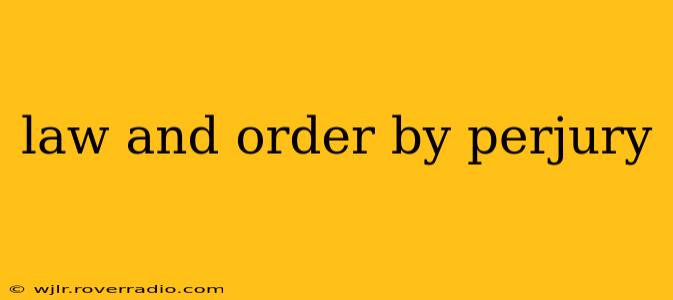Perjury, the act of lying under oath, is a serious offense with significant legal ramifications. This comprehensive guide explores the intricacies of perjury within the context of law and order, examining its definition, elements, penalties, and defenses. Understanding perjury is crucial for legal professionals, witnesses, and anyone interacting with the legal system.
What Constitutes Perjury?
Perjury is the willful act of making a false statement under oath or affirmation in a judicial proceeding, official inquiry, or other legal context. The key elements typically include:
-
A statement made under oath: This oath can be administered in various settings, including courtrooms, depositions, grand jury proceedings, and administrative hearings. The statement must be made knowingly and willingly under oath or affirmation.
-
The statement must be material: This means the false statement must be relevant to the case or proceeding. A minor, insignificant falsehood might not constitute perjury. The materiality is judged by whether the false statement could have influenced the outcome of the legal proceeding.
-
The statement must be false: This is straightforward; the statement made under oath must be demonstrably untrue.
-
The statement must be made with the intent to deceive: The act of lying must be intentional. A simple mistake or oversight is generally not considered perjury. The prosecution must prove the individual knowingly made a false statement with the intent to mislead.
What are the Penalties for Perjury?
Penalties for perjury vary depending on jurisdiction and the specific circumstances of the case. Generally, perjury is a felony offense, punishable by:
-
Imprisonment: Sentences can range from several months to many years, depending on factors like the severity of the lie and its impact on the legal proceeding.
-
Fines: Significant financial penalties are commonly imposed.
-
Disqualification from holding public office: In some cases, conviction for perjury can lead to disqualification from holding public office or certain professional licenses.
-
Impact on future credibility: A perjury conviction severely damages an individual's credibility, making it difficult to testify in future legal proceedings.
What are Some Defenses Against Perjury Charges?
While challenging, there are potential defenses against perjury charges. These often involve demonstrating:
-
Lack of intent to deceive: The accused might argue they made a mistake, didn't understand the question, or genuinely believed their statement to be true, even if it was ultimately inaccurate.
-
Lack of materiality: The defense may contend the false statement was immaterial and had no bearing on the outcome of the legal proceedings.
-
Repentance or retraction: While not a guaranteed defense, retracting the false statement before the proceeding concludes can mitigate the severity of the charge.
-
Insufficient evidence: The prosecution must prove all elements of perjury beyond a reasonable doubt. If they fail to provide sufficient evidence, the accused can be acquitted.
How is Perjury Proved in Court?
Proving perjury requires meticulous investigation and evidence. Common methods include:
-
Witness testimony: Contradicting evidence from other witnesses can help demonstrate the falsity of the statement.
-
Documentary evidence: Documents, records, and other physical evidence can directly contradict the sworn testimony.
-
Expert testimony: Experts might be called to analyze evidence and determine the veracity of the statement.
-
Prior inconsistent statements: Prior statements made by the accused that contradict their sworn testimony can be presented as evidence.
Can Perjury Lead to Further Charges?
A perjury conviction often leads to further investigations and potential charges related to the underlying case in which the false statement was made. This can include obstruction of justice or other related offenses.
What Happens if I Accidentally Lie Under Oath?
Accidental falsehoods are not generally considered perjury. However, honesty and accuracy are paramount when testifying under oath. If you realize you've made a mistake, immediately correct it and inform the court or relevant authority.
Is Perjury a Federal Crime?
Yes, perjury is a federal crime under 18 U.S. Code § 1621. The federal penalties are generally more severe than state-level penalties.
What is the Difference Between Perjury and False Statements?
While both involve untruthfulness, perjury specifically refers to false statements made under oath. False statements in other contexts might carry different penalties.
This exploration of law and order concerning perjury aims to provide a comprehensive overview. However, legal advice should always be sought from a qualified legal professional for specific situations. The information provided here is for educational purposes and should not be considered a substitute for legal counsel.
